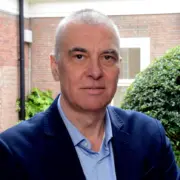Anno 2021 en 76 jaar na het einde van WO II vinden we in Nederland vrijheid gewoon en staan op onze achterste benen als tijdelijke maatregelen onze vrijheid iets beperken. Deze beperkingen vallen echter in het niet bij hoe het zo’n tachtig jaar geleden in Nederland en een groot deel van Europa eraan toeging. Na de oorlog zijn we onder de NAVO paraplu veilig en onder steeds diepere EU samenwerking kenden we grote economische groei. Met Rusland als bedreiging van onze democratie en vrijheid in de Koude Oorlog, hadden de VS en de NAVO gelijke veiligheidsbelangen. Daarom zijn we ruim 75 jaar gewend aan vrijheid en is het idee over wat dat mag kosten volledig uit ons Nederlandse denken en woordgebruik verdwenen. Nu Great Power competitie weer terug is op de geopolitieke agenda, o.a. zichtbaar in Russische verstoringen en moordacties, Chinese powerplay en interne onderdrukking, dreiging van een Iraans atoomprogramma, Noord-Koreaanse raketten en jihadistische strijdgroepen en dat ook nog eens in een geglobaliseerde wereld, moet onze vrijheid geen abstract begrip meer zijn.
Uniek
In veel andere landen bestaat een vrijheid zoals wij die kennen helemaal niet. Wij mogen ongestraft zeggen wat we willen, we mogen geloofsbelijdenis afleggen bij welke god of goden dan ook, seksuele geaardheid en voorkeur zou geen reden voor discriminatie meer moeten zijn, we mogen kiezen uit een hele waaier van politici en we kunnen reizen naar waar we maar willen. Dat is uniek en wordt veel te weinig beseft. Met name Rusland en China proberen de machtige EU uit elkaar te spelen om zelf daar economisch van te profiteren. Ten koste van onze welvaart en onze vrijheid. Daarnaast is de uitbreiding van de Chinese invloedssfeer, duidelijk zichtbaar in Hong Kong en rondom Taiwan, een reden voor de VS om daar meer aandacht aan te besteden. Aandacht die ten koste gaat van Europese verdediging. Daar mogen we na jaren van zelfgenoegzaamheid wel weer zelf iets aan doen. Terecht heeft de Obama regering in 2014 al opgeroepen om meer Europese NAVO inspanningen te verrichten en hebben alle Europese staatshoofden ingestemd met verhoging van hun defensiebudget naar de beroemde 2% in 2024. In Nederland is daar zeven jaar na dato nog weinig van terecht gekomen, we zitten nog niet eens op het Europees gemiddelde, terwijl we wel tot de rijkste Europese landen (en wereldwijd) mogen worden gerekend.
Risee van de NAVO
Zoals de commandanten van de Marine, Landmacht, Luchtmacht en Marechaussee onlangs al openlijk zeiden: we zijn zo’n beetje de risee van de NAVO geworden. Ook de minister van Defensie heeft al opgeroepen voor meer budget om de dreigingen die op Nederland, Europa en het bondgenootschap afkomen te kunnen beantwoorden. Bij gebrek aan een vocabulaire over vrijheid en vechten voor vrijheid, blijft de politiek angstig stil. In de verkiezingsprogramma’s lijkt Defensie meer een verplicht nummer dan een belangrijk beleidsterrein. En ook in de toch al moeizaam lopende formatie lijkt geen enkele politieke partij oog te hebben wat er buiten Nederland gebeurt en wat er voor nodig is om onze welvaart te onderhouden. Dat is een veilig Nederland in een veilige wereld. Waarin vrijheid niet abstract is, maar waar offers voor moeten worden gebracht.
Deze column door HCSS Strategisch Analist Patrick Bolder verscheen voor het eerst in De Telegraaf op zaterdag 1 mei 2021.





